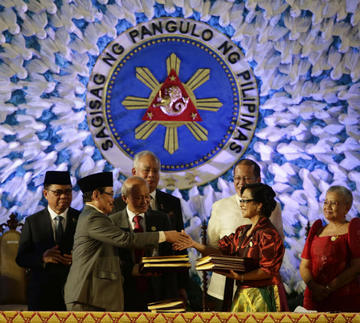In contrast, a survey shows 20% of Filipinos believe that the government should undertake military operation against the MILF

PUBLIC SENTIMENT. Philippine President Benigno Aquino III and Malaysian Prime Minister Najib Razak witness the exchange of documents following the signing of a final peace agreement between the Philippine government and the Moro Islamic Liberation Front on March 27, 2014. File photo by Dennis Sabangan/EPA
Months after the Mamasapano tragedy, many Filipinos still believe that talking peace rather than waging war is a "more effective" way of dealing with rebel group Moro Islamic Liberation Front (MILF).
A Social Weather
Stations (SWS) survey finding released Sunday, May 3, found that nearly 5
in 10 or 45% of Filipinos prefer peace negotiations with the MILF while only
20% believe that the government should undertake military operations against
the group.
Meanwhile, nearly
4 in 10 or 35% of those surveyed said military operations and peaceful
negotiations are "equally effective."
While the survey
showed that more Filipinos continue to back the peace process, support for the
peace negotiations took a hit after the Mamasapano tragedy that killed at least
66 Filipinos.
SWS found that
those who believe in talking peace with the rebel group went down by 17 points
from 62% in March 2014, the same month when the peace agreement between the MILF and the government was
signed.
Meanwhile, war
drums beat louder, the survey showed, as those who said that military
offensives were more effective rose by 11 points from 9% in March 2014.
Those who believe
that talking peace and conducting military offensives also increased – by 6
points from 19%.
Survey
timing
The survey was
conducted among 1,200 adults nationwide on March 20 to March 23, days after the
police Board of Inquiry and the Senate released their respective reports on the botched
police raid in Mamasapano to capture 3 high-value targets.
The Senate cast
the "first sin" on the MILF for allegedly coddling
terrorists while the BOI report found that the 44 elite cops who died in the
clash were shot at close range. The MILF, meanwhile, said the clash was a
"misencounter" and maintained it denounces terrorism as an
organization. At least 17 Moro rebels and 5 civilians also died in the
incident.
The bloody
outcome of the operation caused public outrage that threatened to derail the
passage of the proposed Bangsamoro Basic Law (BBL) in Congress. (READ: Senate, House leaders differ on key BBL provisions)
SWS said the
question on how MILF should be dealt with is part of a more comprehensive
survey on Mamasapano and the BBL conducted in partnership with international
non-governmental organization, The Asia Foundation. Full results of the survey
will be released on May 15, SWS said.
The Asia
Foundation country representative Steven Rood is part of the Third Party
Monitoring Team on the government-MILF peace deal. Prior to joining the group,
he was part of the International Contact Group, a team of foreign observers to
the peace talks.
Months after the Mamasapano tragedy, many Filipinos still believe that talking
peace rather than waging war is a "more effective" way of dealing
with rebel group Moro Islamic Liberation Front (MILF).
A Social Weather
Stations (SWS) survey finding released Sunday, May 3, found that nearly 5
in 10 or 45% of Filipinos prefer peace negotiations with the MILF while only
20% believe that the government should undertake military operations against
the group.
Meanwhile, nearly
4 in 10 or 35% of those surveyed said military operations and peaceful
negotiations are "equally effective."
While the survey
showed that more Filipinos continue to back the peace process, support for the
peace negotiations took a hit after the Mamasapano tragedy that killed at least
66 Filipinos.
SWS found that
those who believe in talking peace with the rebel group went down by 17 points
from 62% in March 2014, the same month when the peace agreement between the MILF and the government was
signed.
Meanwhile, war
drums beat louder, the survey showed, as those who said that military
offensives were more effective rose by 11 points from 9% in March 2014.
Those who believe
that talking peace and conducting military offensives also increased – by 6
points from 19%.
Other
surveys
Peace
negotiations between the government and the MILF started in 1996 – the same
year when the Ramos administration signed a peace accord with MILF's rival
group, the Moro National Liberation Front.
Talks would go on
for another 18 years. Before a peace accord was signed in March 2014, the
process was interrupted by the Estrada administration's all-out war policy and
the declaration of the Memorandum of Agreement on Ancestral Domain with the
Arroyo administration as unconstitutional.
The peace process
in Southern Philippines is now in its second
stage - the passage of the proposed law implementing the peace deal in Congress
and in a plebiscite.
In March, Pulse
Asia released a survey that asked a related question and found a different
response. The survey found that 44% of Filipinos are opposed to the passage of the BBL,
with 62% of those surveyed in Mindanao sharing
the same sentiment.
Meanwhile, an
April SWS survey found that the satisfaction rating of President Benigno Aquino III plunged
to its lowest after Mamasapano.
The SWS media
release publicized on Sunday included more details on the satisfaction rating
survey. It showed that the largest declines in satisfaction with the President
were on aspects that were related to the peace process:
Defending the
country's territorial rights: +22, down from +40
Reconciliation
with Muslim rebels: -3, down from +15
Reconcliiation
with Communist rebels: +17, down from -3
Fighting
terrorims: +6, down from +15
Resolving the
Maguindanao massacre case with justice: -50 from -41
http://www.rappler.com/nation/92065-sws-survey-peace-war-milf

No comments:
Post a Comment
Note: Only a member of this blog may post a comment.